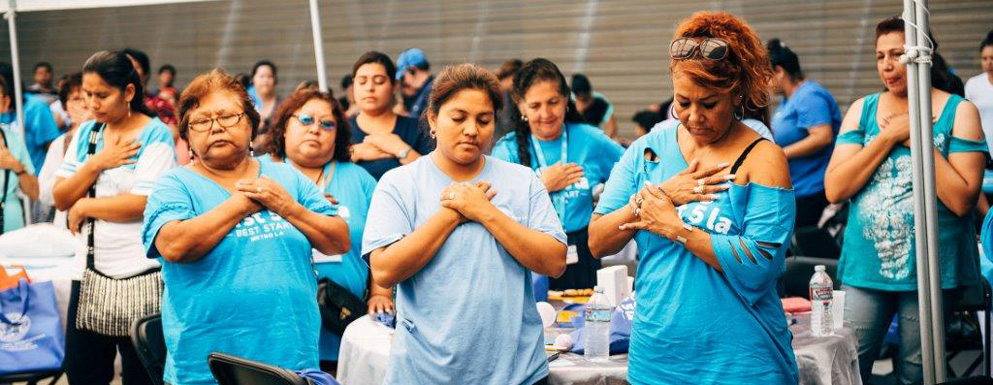
KYCC hosted its first “Culture of Respect” Celebration at the California Science Center on July 30 as the culminating event of our Building Stronger Families (BSF) project. Over the last 10 months, BSF parent participants—the program is heavily parent-led—worked together to address the issue of violence inside and outside the home. Over 600 parents and children attended the daylong event, in the atrium of the Wallis Annenberg Building for Science Learning and Innovation.
BSF is a project of Best Start Metro Los Angeles, the largest of 14 BSM communities funded by First 5 LA. KYCC is the lead partner for the BSF initiative, which also includes All Peoples Community Center, California Science Center, Center for the Pacific Asian Family, Children’s Bureau, Esperanza Housing Corporation, Korean American Family Service, Pathways LA, Peace Over Violence and Worksite Wellness LA.
“This event was a great accomplishment for the Best Start Metro LA (BSMLA) partnership because it gave parent leaders the opportunity to engage their community using the skills they have developed,” said Sam Joo, KYCC Director of Children and Family Services. “And BSMLA parents were absolutely the driving force.”
The “Culture of Respect” Celebration also kicked off the Core Pledge campaign, highlighting the values—Respect, Positive Raising of Children, and Equality for All—identified and developed by BSM parents. They closed their eyes and placed their hands over their hearts as they solemnly—and collectively—made their personal pledge.
“It’s a call to action,” explains Edith Bedolla, KYCC BSF and Prevention Education Manager. “They want people to make the pledge and uphold these values to work actively towards safer and healthier communities.”
A yearlong process
Starting in October 2015, seven different community groups within the BSF collaborative each received nine trainings on how to engage and motivate their communities around how violence affects families and women. The trainings also emphasized how to take action to prevent and stop violence.
The majority of participants were Latina mothers, with a smaller percentage of Latino men, Recently, the newest trainings, located at KYCC’s Menlo Family Apartments, were the most diverse and also the only English-speaking group, with African American, Korean and Latino participants.
Many of the parents are not only involved with the BSF project, but also other aspects of community involvement, such as their children’s schools or with local council district offices.
“The first year really involved capacity building,” said Bedolla, who led all of the trainings. “With this project, the hope is that parents will be able to address these issues and others that arise on their own.”
After the trainings ended in May 2016, a smaller group of 50 participants were selected to continue with leadership training, conflict resolution and facilitating. And yet another subset was created for a peer learning group.
Why violence?
In 2012, the BSMLA collaborative went through a yearlong process to identify the prevailing issues in the community. Violence inside and outside the home were affecting most of the communities in Los Angeles, and were contributing to social isolation.
Through the trainings, the communities became more aware of violence as an issue affecting many families, and of the myriad of resources, such as domestic violence counseling, that are available.
“Many of the parents weren’t accessing the resources available to them, because they either don’t know about the resource, or they don’t even know what they are experiencing is violence,” Bedolla points out. Now resource sharing is common at events, from counseling to health care, to child care and job opportunities.
“It has been inspiring to see the parents’ strength and time commitment,” says Bedolla. “They have so many other responsibilities, yet they are so invested to make changes in their communities and help others be a part of it.”
The Culture of Openness
At the culmination event, families got to put their leadership and event planning tools to work. Parents were given long-stemmed roses when they made the Core Pledge, and children sat at the tables coloring, or playing with the water in the atrium’s fountain.
The morning was split into three workshops: “The Effects of Domestic Violence,” “Healthy Relationships” and “Exploring our Cultural Values.” And in the afternoon, parents put on skits. One was called “Say No to Machismo” and another was about respecting your elders.
“The families are more open,” says Bedolla. “In the beginning, we had some parents who were not as open, but over the year, after hearing information, learning about domestic violence, and starting to see that their peers have had similar experiences to their own, there is a natural openness that occurs.”
Bedolla says that she repeatedly witnesses this transformation. “I want to say it has happened in every group,” she says. “Someone will say, ‘Thank you for sharing what you have gone through.’ And then, they have the courage to share their own personal story.”